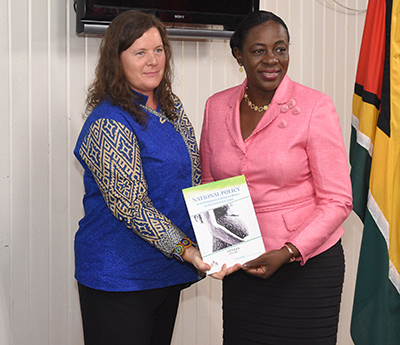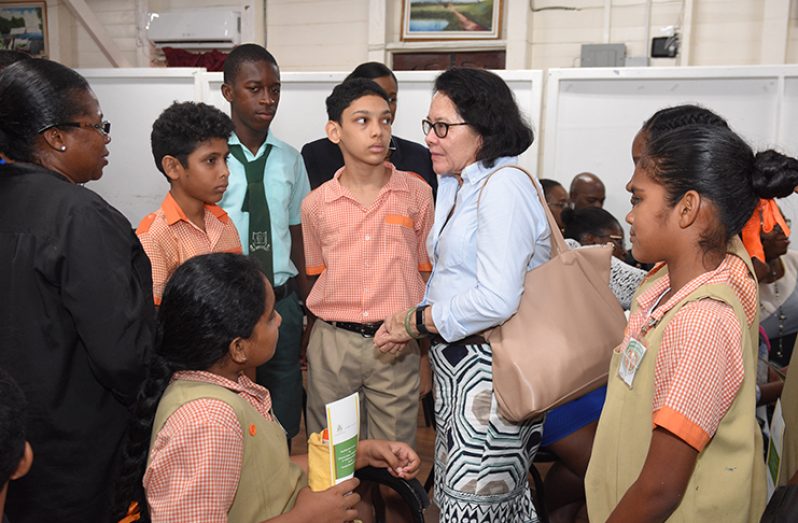…new policy to ensure full reintegration into education system
Government on Monday launched a new policy which will ensure the full reintegration of adolescent mothers into the formal education system, even as First Lady Mrs. Sandra Granger called for a more aggressive approach to health education for both sexes.

Titled ‘National Policy for the Reintegration of Adolescent Mothers in the Formal Education System’, the policy is being implemented by the Ministry of Education in collaboration with the United Nations Children Fund (UNICEF). The goal of the policy is not only to increase the number of adolescent mothers who re-enter the formal school system to complete their secondary education but also to help reduce the number of pregnancy among teenage girls. The policy specifies regulations, mechanisms and procedures that are to be followed to ensure that the girls return to school in order to continue their education, explained Marcel Hutson, Chief Education Officer.
Speaking at the launch held at the National Centre for Education Resource Development (NCERD) in Kingston, First Lady, Mrs. Granger, expressed concerns about teen mothers and the way they are treated in society. She highlighted a few unfortunate scenarios of how girls as young as 10 and 11 years old, get pregnant. “These are things we have to face as a nation and we have to be frank about it. We have to ensure their rights are recognised and upheld and that our legal and social protection agencies protect these children and allow a bright future for them.” Mrs. Granger said.

“We have to speak of these things and see it as violence against our children. We also have to… ensure that their rights are recognised and upheld; that our legal and our social protection agencies protect these children with the full majesty of the law… the children come first and it is their future that we have to ensure… That is enshrined in our Constitution,” she said.
The First Lady also called for a more aggressive approach to health education for both sexes which, she said, should start in the home. “We have to have equal responsibility… The girls do not impregnate themselves so… young men… have to take up their responsibility… This links… with comprehensive health and family life education throughout our school system, which should begin, I think, from nursery. Too often, I think, our parents believe [that] our teachers alone, our education sector, must be responsible for educating the children. Parents also have a duty to make sure that children learn responsible behaviour in society,” she said.
Studies have shown that Guyana has the second highest rate of adolescent pregnancy in the Caribbean and South America, with 97 out of every 1000 girls between the ages of 15 and 19 giving birth. This has resulted in a number of adolescent girls not being granted a second chance to reach their full academic potential. “So new approaches will have to be made to provide adolescents with purpose-driven lives,” Monitoring officer attached to the Ministry of Education, Eleatrice Davenport told the gathering at the launch.
Minister of Education, Nicolette Henry shared that the policy was formulated after a year of rigorous research, consultations and collaborations with a number of government ministries and agencies. She later told reporters that teachers will first have to be trained about the policy for it to be executed properly.
Minister Henry said that while the formulation of the policy is a significant first step, there is still much more to be done to protect the rights of adolescent mothers. “I see this as the beginning of the journey to ensure that all adolescent mothers are protected by rights and supported by the legal framework. With this policy, the work begins to out all the necessary recommendations and mechanisms in place to support out young mothers…
Adolescent pregnancy cannot and must not be the future that we prepare for our daughters… We must act now to ensure a better tomorrow for them, for their families, for their communities, and for this country. As a Government, our motto is that ‘every child matters’. With this policy there will be no need to repeat the past because the future for adolescent mothers in Guyana will become bright… The barriers that prevail will be a thing of the past,” she said.
UNICEF’s representative to Guyana, Sylvie Fouet said in her remarks that her organisation recognises that when girls and women are educated, their children are more likely to survive and to be healthier because these mothers become aware of the importance of better nutrition, immunization, healthcare and the importance of education.
She also stressed that generally, educated mothers tend to send their children to school which is a vital key to breaking the cycle of intergenerational poverty. She also emphasised that adolescent fathers are also included in the policy to ensure that they too finish school.
Ms. Fouet added that the policy uses a holistic approach to adolescent parent education in order to bring Guyana close to achieving the United Nations’ Sustainable Development Goals (SDGs). “This policy has two interesting factors…
The Policy will ensure the teen mothers will [be] given an opportunity to go back to school and receive support at home and within the community… The policy will also allow for teen fathers to engage, encourage, and complete school, [and] take [on] the role [of] ‘super-dad’ and the responsibility [of fatherhood]… We fully support the right of every child to critical information, skills, and a conducive environment [in] which they can grow and [achieve] their full potential… It is part of achieving the SDG… where there is a commitment to leave no one behind,” she said.
(Gabriella Chapman)




.png)









